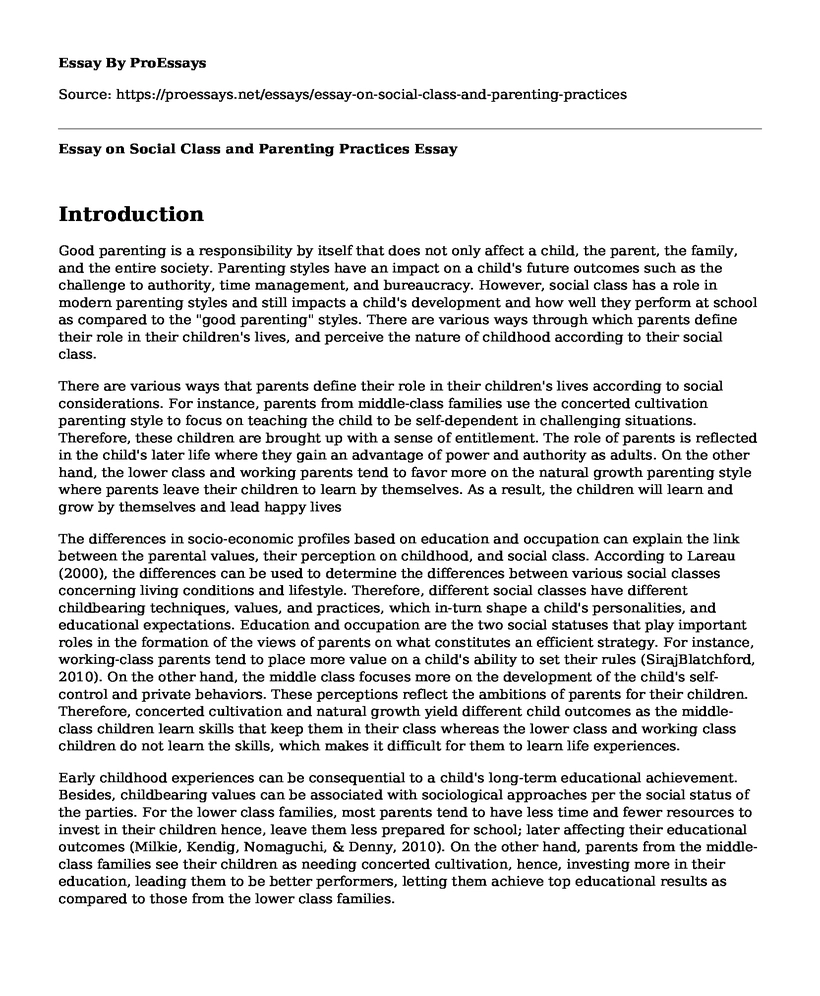Introduction
Good parenting is a responsibility by itself that does not only affect a child, the parent, the family, and the entire society. Parenting styles have an impact on a child's future outcomes such as the challenge to authority, time management, and bureaucracy. However, social class has a role in modern parenting styles and still impacts a child's development and how well they perform at school as compared to the "good parenting" styles. There are various ways through which parents define their role in their children's lives, and perceive the nature of childhood according to their social class.
There are various ways that parents define their role in their children's lives according to social considerations. For instance, parents from middle-class families use the concerted cultivation parenting style to focus on teaching the child to be self-dependent in challenging situations. Therefore, these children are brought up with a sense of entitlement. The role of parents is reflected in the child's later life where they gain an advantage of power and authority as adults. On the other hand, the lower class and working parents tend to favor more on the natural growth parenting style where parents leave their children to learn by themselves. As a result, the children will learn and grow by themselves and lead happy lives
The differences in socio-economic profiles based on education and occupation can explain the link between the parental values, their perception on childhood, and social class. According to Lareau (2000), the differences can be used to determine the differences between various social classes concerning living conditions and lifestyle. Therefore, different social classes have different childbearing techniques, values, and practices, which in-turn shape a child's personalities, and educational expectations. Education and occupation are the two social statuses that play important roles in the formation of the views of parents on what constitutes an efficient strategy. For instance, working-class parents tend to place more value on a child's ability to set their rules (SirajBlatchford, 2010). On the other hand, the middle class focuses more on the development of the child's self-control and private behaviors. These perceptions reflect the ambitions of parents for their children. Therefore, concerted cultivation and natural growth yield different child outcomes as the middle-class children learn skills that keep them in their class whereas the lower class and working class children do not learn the skills, which makes it difficult for them to learn life experiences.
Early childhood experiences can be consequential to a child's long-term educational achievement. Besides, childbearing values can be associated with sociological approaches per the social status of the parties. For the lower class families, most parents tend to have less time and fewer resources to invest in their children hence, leave them less prepared for school; later affecting their educational outcomes (Milkie, Kendig, Nomaguchi, & Denny, 2010). On the other hand, parents from the middle-class families see their children as needing concerted cultivation, hence, investing more in their education, leading them to be better performers, letting them achieve top educational results as compared to those from the lower class families.
Conclusion
The social placement of parents as either being in the lower class, middle class or working class and their perception of the nature of childhood has an impact on a child's development and educational achievements. Sociological considerations of inequality in family lives as a result of social class, therefore, have great impacts on children's lives. Therefore, social class influences a child's progress.
References
Lareau, A. (2000). Social Class and the Daily Lives of Children. Childhood, 7(2), 155-171. doi:10.1177/0907568200007002003
Milkie, M. A., Kendig, S. M., Nomaguchi, K. M., & Denny, K. E. (2010). Time with children, children's wellbeing, and workfamily balance among employed parents. Journal of Marriage and Family, 72(5), 1329-1343.
SirajBlatchford, I. (2010). Learning in the home and at school: How working class children 'succeed against the odds'. British educational research journal, 36(3), 463-482.
Cite this page
Essay on Social Class and Parenting Practices. (2022, Mar 15). Retrieved from https://proessays.net/essays/essay-on-social-class-and-parenting-practices
If you are the original author of this essay and no longer wish to have it published on the ProEssays website, please click below to request its removal:
- Essay Example on Social Issue - The Effect of Divorce for Young Generation
- Communication in Organizations Paper Example
- Ethical and Moral Dilemma of a Defense Lawyer Essay
- Community Assessment Paper Example
- Maternal Time & Child-Rearing: Impact on Women & Men - Essay Sample
- Essay on Exploring Human Relationships: Differentiating Interactions and Characteristics
- Essay Example on Interpersonal, Verbal & Written Communication: Strengthening Relationships







